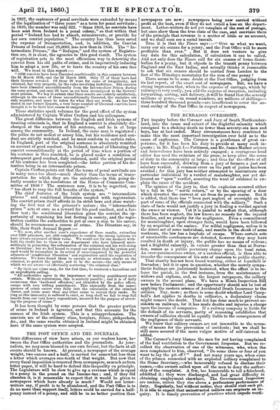THE POST OFFICE AND THE JOURNALS.
SOME differences of view have arisen, as our readers know, be- tween the Post Office authorities and the journalists. As jour- nalists, we may seem biassed in our own favour, but the facts at all events should be known. At present, a newspaper of the average weight, two ounces and a half, is carried for somewhat less than a letter which averages one-tenth of that weight. But now that every fiscal imposition is removed from newspapers, asmuch as from letter paper, it will be hard to defend this inequality on principle. The Legislature will be slow to give up a revenue which is equal to a penny in the pound on. the Income-tax ; and, if they did abandon it, is it reasonable to expect that it would be given to newspapers which have already so much ? Would not letter- writers say, if profit is to be abandoned, and the Post Office is to do no more than support itself, letters could be carried for a half- penny instead of a. penny, and still be in no better position than newspapers are now; newspapers being now carried without profit at the best, even if they do not entail a loss on the depart- ment. Letter-writers do not yet complain of the cost of postage, but once show them the true state of the ease, and convince them of the principle that revenue is a matter of little or no account, and we shall soon see a social tumult.
True it is that the Times says :—" Give us what we want, carry our six ounces for a penny, and the Post Office will be more profitable than ever." But it does not venture to give any data for this calculation, if calculation it can be called. And not only does the Times call for six ounces of home distri- bution for a penny, but it objects to the transit penny between F.ogland and the East Indies, and actually thinks it reasonable to ask that six ounces should be carried from London to the foot of the Himalaya mountains for the sum of one penny ! There seems to be some doubt at the Post Office, judging from its last report, of the exact cost of newspapers. Bat, we have a strong impression that, when to the expense of carriage, which by railways is very costly, you add the expense of reception, including forwarding, sorting, and delivery, it will be found that the seventy millions of pence,—in round numbers, six millions of shillings— three hundred thousand pounds—are insufficient to cover the an- nual outlay of the Post Office in respect of newspapers.


























 Previous page
Previous page